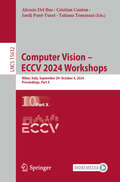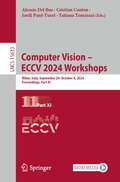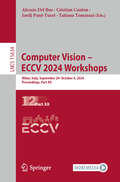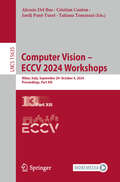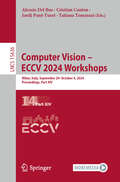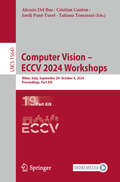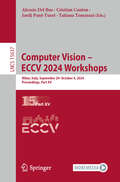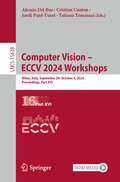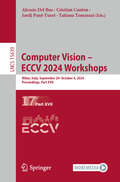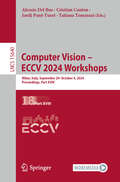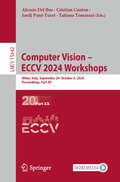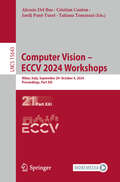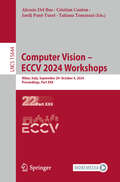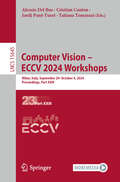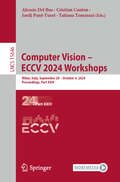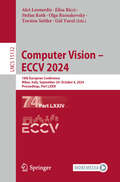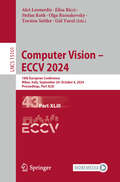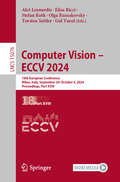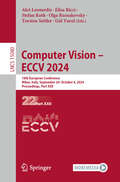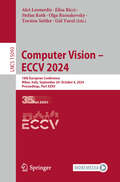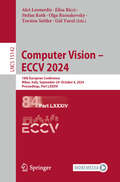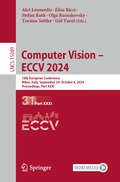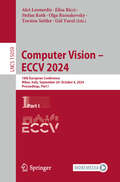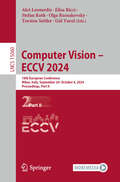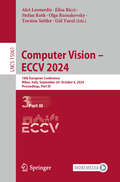- Table View
- List View
Computer Vision – ECCV 2024 Workshops: Milan, Italy, September 29–October 4, 2024, Proceedings, Part X (Lecture Notes in Computer Science #15632)
by Tatiana Tommasi Alessio Del Bue Cristian Canton Jordi Pont-TusetThe multi-volume set LNCS 15623 until LNCS 15646 constitutes the proceedings of the workshops that were held in conjunction with the 18th European Conference on Computer Vision, ECCV 2024, which took place in Milan, Italy, during September 29–October 4, 2024. These LNCS volumes contain 574 accepted papers from 53 of the 73 workshops. The list of workshops and distribution of the workshop papers in the LNCS volumes can be found in the preface that is freely accessible online.
Computer Vision – ECCV 2024 Workshops: Milan, Italy, September 29–October 4, 2024, Proceedings, Part XI (Lecture Notes in Computer Science #15633)
by Tatiana Tommasi Alessio Del Bue Cristian Canton Jordi Pont-TusetThe multi-volume set LNCS 15623 until LNCS 15646 constitutes the proceedings of the workshops that were held in conjunction with the 18th European Conference on Computer Vision, ECCV 2024, which took place in Milan, Italy, during September 29–October 4, 2024. These LNCS volumes contain 574 accepted papers from 53 of the 73 workshops. The list of workshops and distribution of the workshop papers in the LNCS volumes can be found in the preface that is freely accessible online.
Computer Vision – ECCV 2024 Workshops: Milan, Italy, September 29–October 4, 2024, Proceedings, Part XII (Lecture Notes in Computer Science #15634)
by Tatiana Tommasi Alessio Del Bue Cristian Canton Jordi Pont-TusetThe multi-volume set LNCS 15623 until LNCS 15646 constitutes the proceedings of the workshops that were held in conjunction with the 18th European Conference on Computer Vision, ECCV 2024, which took place in Milan, Italy, during September 29–October 4, 2024. These LNCS volumes contain 574 accepted papers from 53 of the 73 workshops. The list of workshops and distribution of the workshop papers in the LNCS volumes can be found in the preface that is freely accessible online.
Computer Vision – ECCV 2024 Workshops: Milan, Italy, September 29–October 4, 2024, Proceedings, Part XIII (Lecture Notes in Computer Science #15635)
by Tatiana Tommasi Alessio Del Bue Cristian Canton Jordi Pont-TusetThe multi-volume set LNCS 15623 until LNCS 15646 constitutes the proceedings of the workshops that were held in conjunction with the 18th European Conference on Computer Vision, ECCV 2024, which took place in Milan, Italy, during September 29–October 4, 2024. These LNCS volumes contain 574 accepted papers from 53 of the 73 workshops. The list of workshops and distribution of the workshop papers in the LNCS volumes can be found in the preface that is freely accessible online.
Computer Vision – ECCV 2024 Workshops: Milan, Italy, September 29–October 4, 2024, Proceedings, Part XIV (Lecture Notes in Computer Science #15636)
by Tatiana Tommasi Alessio Del Bue Cristian Canton Jordi Pont-TusetThe multi-volume set LNCS 15623 until LNCS 15646 constitutes the proceedings of the workshops that were held in conjunction with the 18th European Conference on Computer Vision, ECCV 2024, which took place in Milan, Italy, during September 29–October 4, 2024. These LNCS volumes contain 574 accepted papers from 53 of the 73 workshops. The list of workshops and distribution of the workshop papers in the LNCS volumes can be found in the preface that is freely accessible online.
Computer Vision – ECCV 2024 Workshops: Milan, Italy, September 29–October 4, 2024, Proceedings, Part XIX (Lecture Notes in Computer Science #15641)
by Tatiana Tommasi Alessio Del Bue Cristian Canton Jordi Pont-TusetThe multi-volume set LNCS 15623 until LNCS 15646 constitutes the proceedings of the workshops that were held in conjunction with the 18th European Conference on Computer Vision, ECCV 2024, which took place in Milan, Italy, during September 29–October 4, 2024. These LNCS volumes contain 574 accepted papers from 53 of the 73 workshops. The list of workshops and distribution of the workshop papers in the LNCS volumes can be found in the preface that is freely accessible online.
Computer Vision – ECCV 2024 Workshops: Milan, Italy, September 29–October 4, 2024, Proceedings, Part XV (Lecture Notes in Computer Science #15637)
by Tatiana Tommasi Alessio Del Bue Cristian Canton Jordi Pont-TusetThe multi-volume set LNCS 15623 until LNCS 15646 constitutes the proceedings of the workshops that were held in conjunction with the 18th European Conference on Computer Vision, ECCV 2024, which took place in Milan, Italy, during September 29–October 4, 2024. These LNCS volumes contain 574 accepted papers from 53 of the 73 workshops. The list of workshops and distribution of the workshop papers in the LNCS volumes can be found in the preface that is freely accessible online.
Computer Vision – ECCV 2024 Workshops: Milan, Italy, September 29–October 4, 2024, Proceedings, Part XVI (Lecture Notes in Computer Science #15638)
by Tatiana Tommasi Alessio Del Bue Cristian Canton Jordi Pont-TusetThe multi-volume set LNCS 15623 until LNCS 15646 constitutes the proceedings of the workshops that were held in conjunction with the 18th European Conference on Computer Vision, ECCV 2024, which took place in Milan, Italy, during September 29–October 4, 2024. These LNCS volumes contain 574 accepted papers from 53 of the 73 workshops. The list of workshops and distribution of the workshop papers in the LNCS volumes can be found in the preface that is freely accessible online.
Computer Vision – ECCV 2024 Workshops: Milan, Italy, September 29–October 4, 2024, Proceedings, Part XVII (Lecture Notes in Computer Science #15639)
by Tatiana Tommasi Alessio Del Bue Cristian Canton Jordi Pont-TusetThe multi-volume set LNCS 15623 until LNCS 15646 constitutes the proceedings of the workshops that were held in conjunction with the 18th European Conference on Computer Vision, ECCV 2024, which took place in Milan, Italy, during September 29–October 4, 2024. These LNCS volumes contain 574 accepted papers from 53 of the 73 workshops. The list of workshops and distribution of the workshop papers in the LNCS volumes can be found in the preface that is freely accessible online.
Computer Vision – ECCV 2024 Workshops: Milan, Italy, September 29–October 4, 2024, Proceedings, Part XVIII (Lecture Notes in Computer Science #15640)
by Tatiana Tommasi Alessio Del Bue Cristian Canton Jordi Pont-TusetThe multi-volume set LNCS 15623 until LNCS 15646 constitutes the proceedings of the workshops that were held in conjunction with the 18th European Conference on Computer Vision, ECCV 2024, which took place in Milan, Italy, during September 29–October 4, 2024. These LNCS volumes contain 574 accepted papers from 53 of the 73 workshops. The list of workshops and distribution of the workshop papers in the LNCS volumes can be found in the preface that is freely accessible online.
Computer Vision – ECCV 2024 Workshops: Milan, Italy, September 29–October 4, 2024, Proceedings, Part XX (Lecture Notes in Computer Science #15642)
by Tatiana Tommasi Alessio Del Bue Cristian Canton Jordi Pont-TusetThe multi-volume set LNCS 15623 until LNCS 15646 constitutes the proceedings of the workshops that were held in conjunction with the 18th European Conference on Computer Vision, ECCV 2024, which took place in Milan, Italy, during September 29–October 4, 2024. These LNCS volumes contain 574 accepted papers from 53 of the 73 workshops. The list of workshops and distribution of the workshop papers in the LNCS volumes can be found in the preface that is freely accessible online.
Computer Vision – ECCV 2024 Workshops: Milan, Italy, September 29–October 4, 2024, Proceedings, Part XXI (Lecture Notes in Computer Science #15643)
by Tatiana Tommasi Alessio Del Bue Cristian Canton Jordi Pont-TusetThe multi-volume set LNCS 15623 until LNCS 15646 constitutes the proceedings of the workshops that were held in conjunction with the 18th European Conference on Computer Vision, ECCV 2024, which took place in Milan, Italy, during September 29–October 4, 2024. These LNCS volumes contain 574 accepted papers from 53 of the 73 workshops. The list of workshops and distribution of the workshop papers in the LNCS volumes can be found in the preface that is freely accessible online.
Computer Vision – ECCV 2024 Workshops: Milan, Italy, September 29–October 4, 2024, Proceedings, Part XXII (Lecture Notes in Computer Science #15644)
by Tatiana Tommasi Alessio Del Bue Cristian Canton Jordi Pont-TusetThe multi-volume set LNCS 15623 until LNCS 15646 constitutes the proceedings of the workshops that were held in conjunction with the 18th European Conference on Computer Vision, ECCV 2024, which took place in Milan, Italy, during September 29–October 4, 2024. These LNCS volumes contain 574 accepted papers from 53 of the 73 workshops. The list of workshops and distribution of the workshop papers in the LNCS volumes can be found in the preface that is freely accessible online.
Computer Vision – ECCV 2024 Workshops: Milan, Italy, September 29–October 4, 2024, Proceedings, Part XXIII (Lecture Notes in Computer Science #15645)
by Tatiana Tommasi Alessio Del Bue Cristian Canton Jordi Pont-TusetThe multi-volume set LNCS 15623 until LNCS 15646 constitutes the proceedings of the workshops that were held in conjunction with the 18th European Conference on Computer Vision, ECCV 2024, which took place in Milan, Italy, during September 29–October 4, 2024. These LNCS volumes contain 574 accepted papers from 53 of the 73 workshops. The list of workshops and distribution of the workshop papers in the LNCS volumes can be found in the preface that is freely accessible online.
Computer Vision – ECCV 2024 Workshops: Milan, Italy, September 29–October 4, 2024, Proceedings, Part XXIV (Lecture Notes in Computer Science #15646)
by Tatiana Tommasi Alessio Del Bue Cristian Canton Jordi Pont-TusetThe multi-volume set LNCS 15623 until LNCS 15646 constitutes the proceedings of the workshops that were held in conjunction with the 18th European Conference on Computer Vision, ECCV 2024, which took place in Milan, Italy, during September 29–October 4, 2024. These LNCS volumes contain 574 accepted papers from 53 of the 73 workshops. The list of workshops and distribution of the workshop papers in the LNCS volumes can be found in the preface that is freely accessible online.
Computer Vision – ECCV 2024: 18th European Conference, Milan, Italy, September 29 – October 4, 2024, Proceedings, Part LXXIV (Lecture Notes in Computer Science #15132)
by Stefan Roth Aleš Leonardis Elisa Ricci Torsten Sattler Olga Russakovsky Gül VarolThe multi-volume set of LNCS books with volume numbers 15059 upto 15147 constitutes the refereed proceedings of the 18th European Conference on Computer Vision, ECCV 2024, held in Milan, Italy, during September 29–October 4, 2024. The 2387 papers presented in these proceedings were carefully reviewed and selected from a total of 8585 submissions. They deal with topics such as Computer vision, Machine learning, Deep neural networks, Reinforcement learning, Object recognition, Image classification, Image processing, Object detection, Semantic segmentation, Human pose estimation, 3D reconstruction, Stereo vision, Computational photography, Neural networks, Image coding, Image reconstruction and Motion estimation.
Computer Vision – ECCV 2024: 18th European Conference, Milan, Italy, September 29–October 4, 2024, Proceedings, Part XLIII (Lecture Notes in Computer Science #15101)
by Stefan Roth Aleš Leonardis Elisa Ricci Torsten Sattler Olga Russakovsky Gül VarolThe multi-volume set of LNCS books with volume numbers 15059 up to 15147 constitutes the refereed proceedings of the 18th European Conference on Computer Vision, ECCV 2024, held in Milan, Italy, during September 29–October 4, 2024. The 2387 papers presented in these proceedings were carefully reviewed and selected from a total of 8585 submissions. They deal with topics such as computer vision; machine learning; deep neural networks; reinforcement learning; object recognition; image classification; image processing; object detection; semantic segmentation; human pose estimation; 3d reconstruction; stereo vision; computational photography; neural networks; image coding; image reconstruction; object recognition; motion estimation.
Computer Vision – ECCV 2024: 18th European Conference, Milan, Italy, September 29 – October 4, 2024, Proceedings, Part XVIII (Lecture Notes in Computer Science #15076)
by Stefan Roth Aleš Leonardis Elisa Ricci Torsten Sattler Olga Russakovsky Gül VarolThe multi-volume set of LNCS books with volume numbers 15059 up to 15147 constitutes the refereed proceedings of the 18th European Conference on Computer Vision, ECCV 2024, held in Milan, Italy, during September 29–October 4, 2024. The 2387 papers presented in these proceedings were carefully reviewed and selected from a total of 8585 submissions. The papers deal with topics such as computer vision; machine learning; deep neural networks; reinforcement learning; object recognition; image classification; image processing; object detection; semantic segmentation; human pose estimation; 3d reconstruction; stereo vision; computational photography; neural networks; image coding; image reconstruction; motion estimation.
Computer Vision – ECCV 2024: 18th European Conference, Milan, Italy, September 29 – October 4, 2024, Proceedings, Part XXII (Lecture Notes in Computer Science #15080)
by Stefan Roth Aleš Leonardis Elisa Ricci Torsten Sattler Olga Russakovsky Gül VarolThe multi-volume set of LNCS books with volume numbers 15059 up to 15147 constitutes the refereed proceedings of the 18th European Conference on Computer Vision, ECCV 2024, held in Milan, Italy, during September 29–October 4, 2024. The 2387 papers presented in these proceedings were carefully reviewed and selected from a total of 8585 submissions. The papers deal with topics such as computer vision; machine learning; deep neural networks; reinforcement learning; object recognition; image classification; image processing; object detection; semantic segmentation; human pose estimation; 3d reconstruction; stereo vision; computational photography; neural networks; image coding; image reconstruction; motion estimation.
Computer Vision – ECCV 2024: 18th European Conference, Milan, Italy, September 29 – October 4, 2024, Proceedings, Part XXXV (Lecture Notes in Computer Science #15093)
by Stefan Roth Aleš Leonardis Elisa Ricci Torsten Sattler Olga Russakovsky Gül VarolThe multi-volume set of LNCS books with volume numbers 15059 up to 15147 constitutes the refereed proceedings of the 18th European Conference on Computer Vision, ECCV 2024, held in Milan, Italy, during September 29–October 4, 2024. The 2387 papers presented in these proceedings were carefully reviewed and selected from a total of 8585 submissions. They deal with topics such as computer vision; machine learning; deep neural networks; reinforcement learning; object recognition; image classification; image processing; object detection; semantic segmentation; human pose estimation; 3d reconstruction; stereo vision; computational photography; neural networks; image coding; image reconstruction; object recognition; motion estimation.
Computer Vision – ECCV 2024: 18th European Conference, Milan, Italy, September 29 – October 4, 2024, Proceedings, Part LXXXIV (Lecture Notes in Computer Science #15142)
by Stefan Roth Aleš Leonardis Elisa Ricci Torsten Sattler Olga Russakovsky Gül VarolThe multi-volume set of LNCS books with volume numbers 15059 upto 15147 constitutes the refereed proceedings of the 18th European Conference on Computer Vision, ECCV 2024, held in Milan, Italy, during September 29–October 4, 2024. The 2387 papers presented in these proceedings were carefully reviewed and selected from a total of 8585 submissions. They deal with topics such as Computer vision, Machine learning, Deep neural networks, Reinforcement learning, Object recognition, Image classification, Image processing, Object detection, Semantic segmentation, Human pose estimation, 3D reconstruction, Stereo vision, Computational photography, Neural networks, Image coding, Image reconstruction and Motion estimation.
Computer Vision – ECCV 2024: 18th European Conference, Milan, Italy, September 29–October 4, 2024, Proceedings, Part XXXI (Lecture Notes in Computer Science #15089)
by Stefan Roth Aleš Leonardis Elisa Ricci Torsten Sattler Olga Russakovsky Gül VarolThe multi-volume set of LNCS books with volume numbers 15059 up to 15147 constitutes the refereed proceedings of the 18th European Conference on Computer Vision, ECCV 2024, held in Milan, Italy, during September 29–October 4, 2024. The 2387 papers presented in these proceedings were carefully reviewed and selected from a total of 8585 submissions. They deal with topics such as computer vision; machine learning; deep neural networks; reinforcement learning; object recognition; image classification; image processing; object detection; semantic segmentation; human pose estimation; 3d reconstruction; stereo vision; computational photography; neural networks; image coding; image reconstruction; motion estimation.
Computer Vision – ECCV 2024: 18th European Conference, Milan, Italy, September 29–October 4, 2024, Proceedings, Part I (Lecture Notes in Computer Science #15059)
by Stefan Roth Aleš Leonardis Elisa Ricci Torsten Sattler Olga Russakovsky Gül VarolThe multi-volume set of LNCS books with volume numbers 15059 up to 15147 constitutes the refereed proceedings of the 18th European Conference on Computer Vision, ECCV 2024, held in Milan, Italy, during September 29–October 4, 2024. The 2387 papers presented in these proceedings were carefully reviewed and selected from a total of 8585 submissions. They deal with topics such as computer vision; machine learning; deep neural networks; reinforcement learning; object recognition; image classification; image processing; object detection; semantic segmentation; human pose estimation; 3d reconstruction; stereo vision; computational photography; neural networks; image coding; image reconstruction; motion estimation.
Computer Vision – ECCV 2024: 18th European Conference, Milan, Italy, September 29–October 4, 2024, Proceedings, Part II (Lecture Notes in Computer Science #15060)
by Stefan Roth Aleš Leonardis Elisa Ricci Torsten Sattler Olga Russakovsky Gül VarolThe multi-volume set of LNCS books with volume numbers 15059 up to 15147 constitutes the refereed proceedings of the 18th European Conference on Computer Vision, ECCV 2024, held in Milan, Italy, during September 29–October 4, 2024. The 2387 papers presented in these proceedings were carefully reviewed and selected from a total of 8585 submissions. They deal with topics such as computer vision; machine learning; deep neural networks; reinforcement learning; object recognition; image classification; image processing; object detection; semantic segmentation; human pose estimation; 3d reconstruction; stereo vision; computational photography; neural networks; image coding; image reconstruction; motion estimation.
Computer Vision – ECCV 2024: 18th European Conference, Milan, Italy, September 29–October 4, 2024, Proceedings, Part III (Lecture Notes in Computer Science #15061)
by Stefan Roth Aleš Leonardis Elisa Ricci Torsten Sattler Olga Russakovsky Gül VarolThe multi-volume set of LNCS books with volume numbers 15059 up to 15147 constitutes the refereed proceedings of the 18th European Conference on Computer Vision, ECCV 2024, held in Milan, Italy, during September 29–October 4, 2024. The 2387 papers presented in these proceedings were carefully reviewed and selected from a total of 8585 submissions. They deal with topics such as computer vision; machine learning; deep neural networks; reinforcement learning; object recognition; image classification; image processing; object detection; semantic segmentation; human pose estimation; 3d reconstruction; stereo vision; computational photography; neural networks; image coding; image reconstruction; motion estimation.
